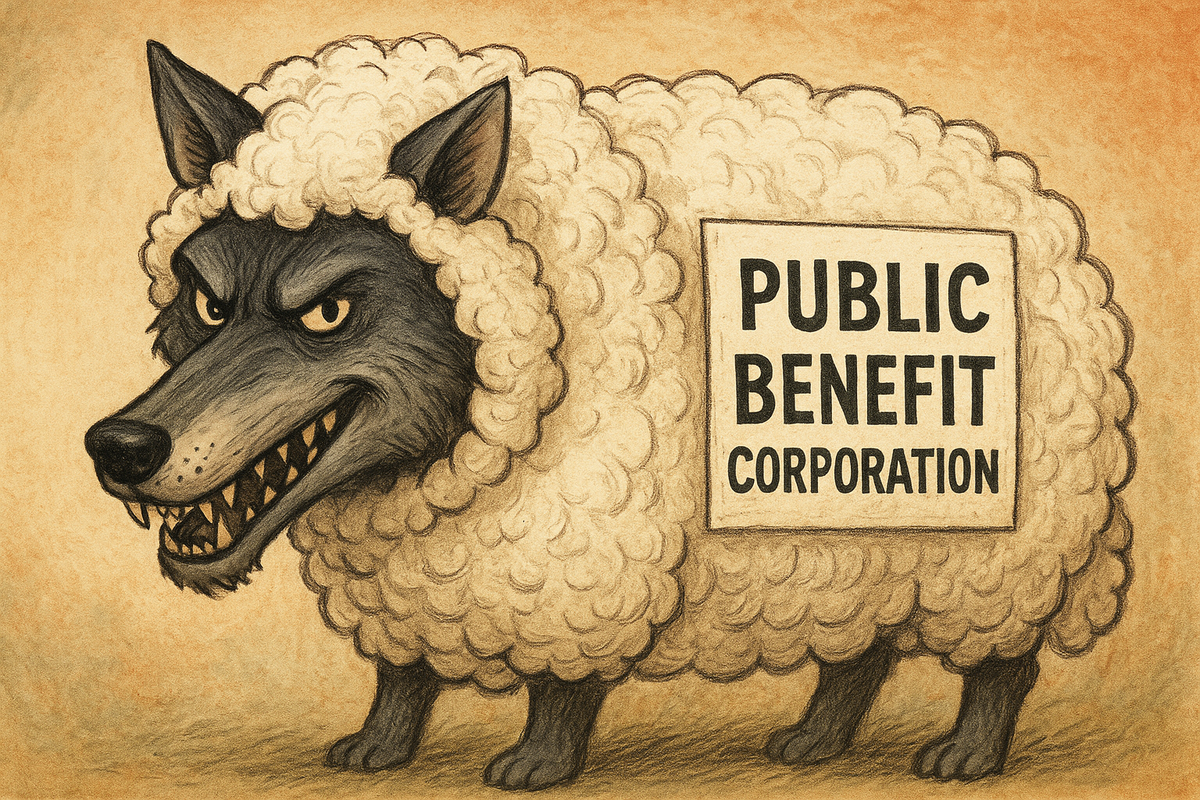A Wolf Dressed in PBC Clothing

I was preparing to write a story about why OpenAI shouldn’t be allowed to become a public benefit corporation when this week brought news that it had already transitioned to a PBC as part of its corporate restructuring from nonprofit to for-profit.
For me (shaking his head), the heart of the issue here is that question: How could OpenAI be a public benefit corporation?
Which then occasioned a follow-on question: Should there even be such a thing as public benefit corporations?
So, this piece twofer: a bit about OpenAI as an example of why it shouldn’t be a PBC and a plea that something needs to change with PBCs
It helps to first understand what a PBC is. I’ve written about it recently and there’s lots to be found elsewhere, so I won’t give you a lengthy description (you can find that on your own) except to say that it is a corporation that is legally required to create a public benefit. PBCs also must prove this benefit through a third-party assessment and – depending upon the state – publish the findings in an annual benefit report, aka impact report.
I’d venture to say that people generally feel a glow about PBCs and attribute a positive association to them for their actions to use business for good – whether we’re buying from them, working for them, lending to them, investing in them.
So, would a company that behaves in the following ways conjure up a PBC in your mind?
• Staking a claim to allow adult erotica on its platform, or as Wired said in this headline, “ChatGPT’s Horny Era Could Be Its Stickiest Yet.” (Hello, F-bots!)
• Siccing its lawyers on nonprofits, such as Encode, a small AI safety organization.
• Brazenly violating all sorts of copyright laws and now by enabling what it calls, “unauthorized generations.” (That’s lawyer-speak for enabling its Sora app to create deep-fake representations of people – typically celebrities – without their permission. Love that actor Bryan Cranston had to go all “Breaking Bad” on them.)
Maybe it’s part of this company simply growing up, and we all wonder how that cute little kid became such a shit. As one tweet put it:
“OpenAI in 2021: ‘we want to cure brain cancer’
OpenAI in 2025: ‘we’re becoming brain cancer’”
(Source: Project Liberty)
And here’s a cogent take from my friend and founder of Cotopaxi, Davis Smith: “Capitalism is broken. When a company worth billions (OpenAI/ChatGPT) decides the next frontier of AI is erotic content, we know we have lost our way. This isn’t innovation. Sam Altman brands this as progress, but it’s quite the opposite. It’s returning us to the economic systems of exploitation, driven by greed.”
It begs the question: Why did OpenAI take the step of becoming a PBC anyway? Party conversation? Feelings of guilt? Sheep’s clothing.
Can it truly be that, as Casey Newton said of OpenAI on a recent episode of the Hard Fork podcast, “They do still identify as this kind of mission-driven company that’s trying to create AI to benefit all of humanity.”
If that IS the case, I’d like to see their behavior change, a list of the specific public benefits they aim to fulfill – and I mean specific – and regular public reporting of their impact and their progress against these objectives.
Doubting we’ll see this anytime soon.
As a little thought experiment, I asked ChatGPT for a list of OpenAI’s business practices that ethically could be at odds with OpenAI becoming a PBC:
• Lack of transparency about board decisions and governance structure
• Non-independent or conflicted board composition
• Secretive funding or partnership agreements
• Prioritizing short-term profitability over stakeholder welfare
• Investor pressure without purpose safeguards
• Executive compensation tied solely to financial performance
Oh, that’s not all – the list goes on:
• Collecting or monetizing user data without explicit consent
• Token “impact projects” – benefit washing instead of measurable and transparent benefit reporting
• Overreaching NDAs or silencing whistleblowers
• Weaponizing lawsuits or subpoenas against critics or nonprofits
There are more, but you get the idea.
For its part, OpenAI has created a manifesto of sorts called "Built to Benefit Everyone," which focuses primarily on health and curing diseases plus what they're calling, "Technical solutions to AI resilience."
(Something about Built to Benefit Everyone causes my head to cock, my neck to kink, and credulity to be stretched.)
Ultimately, it’s all about trust built upon proven and transparent actions, isn’t it? And this piece by the former leader of product safety at OpenAI certainly gives all of us more reason to hit “pause” on this company and its beneficial claims.
Last year, Andrew Kassoy, the now-deceased co-founder of B Lab – the nonprofit organization that created B Corp certification and also laid the groundwork for model public benefit corporation legislation – addressed the insufficiency of OpenAI’s approach to becoming a PBC in an opinion piece for the New York Times.
All of which highlights the structural weaknesses of PBC legislation – there is pretty much zero enforcement of its legal requirements. So why not slap it on your website and your investor presentations?
We wrote about some of these problems earlier this year, “The Dirty Little Secret of Benefit Corporations.”
It’s clear to me, especially with OpenAI’s public embrace drawing so much attention to the PBC badge, that this legal designation needs be drastically strengthened, or if that isn’t possible, it needs to go away.
What do you think?
Godspeed, friends.
Russ
💬 Think About It
"Instead of 'going public,' you could say we’re 'going purpose.' Instead of extracting value from nature and transforming it into wealth for investors, we’ll use the wealth Patagonia creates to protect the source of all wealth." Yvon Chouinard, founder, Patagonia
💥 Quick Hits
- Weird posters – For all who are fans of design, typography, and movie posters, behold the phantasmagorical sensibility of Yorgis Yanthimos. Plus, have you seen his recent movie, Bugonia? The story, the acting, the typeface in the movie title are all crazy 🤯 (New York Times)
- On legacy – Got this lovely ‘riff’ on legacy from reader and B1G1 cofounder, Paul Dunn: "Legacy is not what you leave behind … it’s what you set in motion."
- AI is coming to a nonprofit near you – Blackbaud, a leading provider of software solutions for nonprofits, is going all-in on AI. (Blackbaud).
Find the Most Meaningful Work of Your Career
📰 Big News! Our partner One Work, which has provided meaningful work job listings to us for nearly three years, has decided to take a powder, a hiatus, a break – pick your own descriptor for founder Greg Rancourt's decision to take a great, big exhalation. (Good luck and many thanks to you, Greg 🙏.)
In the interim, I'll fill this space with other content – unless I hear a big chorus of "Bring back the job listings," in which case I'll figure some way to do that.
So, for today, here's a song apropos the current state of the world and a sweet acoustic duo by a daughter and a father.
If you enjoy this newsletter, please share it with a friend. See you next week!
